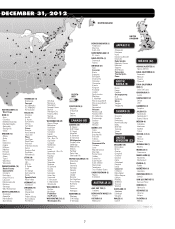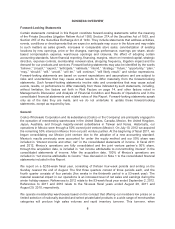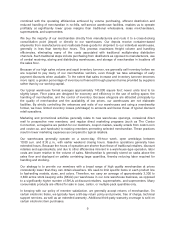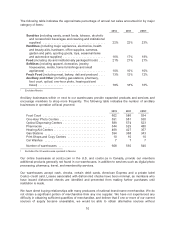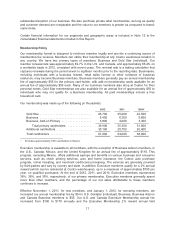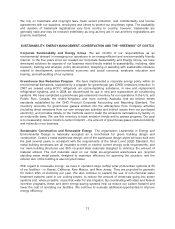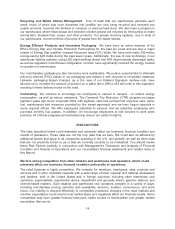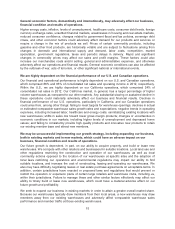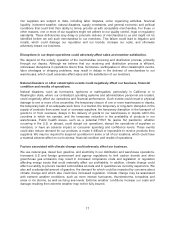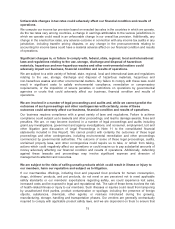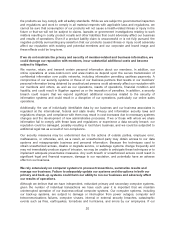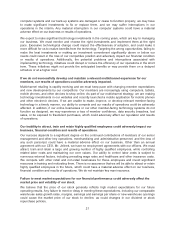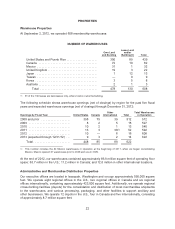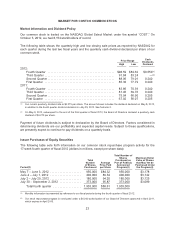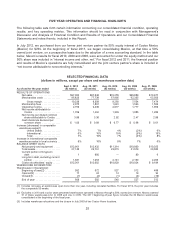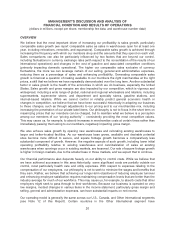Costco 2012 Annual Report Download - page 19
Download and view the complete annual report
Please find page 19 of the 2012 Costco annual report below. You can navigate through the pages in the report by either clicking on the pages listed below, or by using the keyword search tool below to find specific information within the annual report.Our suppliers are subject to risks, including labor disputes, union organizing activities, financial
liquidity, inclement weather, natural disasters, supply constraints, and general economic and political
conditions that could limit their ability to timely provide us with acceptable merchandise. For these or
other reasons, one or more of our suppliers might not adhere to our quality control, legal or regulatory
standards. These deficiencies may delay or preclude delivery of merchandise to us and might not be
identified before we sell such merchandise to our members. This failure could lead to litigation and
recalls, which could damage our reputation and our brands, increase our costs, and otherwise
adversely impact our business.
Disruptions in our depot operations could adversely affect sales and member satisfaction.
We depend on the orderly operation of the merchandise receiving and distribution process, primarily
through our depots. Although we believe that our receiving and distribution process is efficient,
unforeseen disruptions in operations due to fires, hurricanes, earthquakes or other catastrophic events,
labor shortages or shipping problems, may result in delays in the delivery of merchandise to our
warehouses, which could adversely affect sales and the satisfaction of our members.
Natural disasters or other catastrophic events could negatively affect our business, financial
condition and results of operations.
Natural disasters, such as hurricanes, typhoons or earthquakes, particularly in California or in
Washington state, where our centralized operating systems and administrative personnel are located,
could negatively affect our operations and financial performance. Such events could result in physical
damage to one or more of our properties, the temporary closure of one or more warehouses or depots,
the temporary lack of an adequate work force in a market, the temporary or long-term disruption in the
supply of products from some local or overseas suppliers, the temporary disruption in the transport of
goods to or from overseas, delays in the delivery of goods to our warehouses or depots within the
countries in which we operate, and the temporary reduction in the availability of products in our
warehouses. Public health issues, such as a potential H1N1 flu (swine flu) pandemic, whether
occurring in the U.S. or abroad, could disrupt our operations, disrupt the operations of suppliers or
members, or have an adverse impact on consumer spending and confidence levels. These events
could also reduce demand for our products or make it difficult or impossible to receive products from
suppliers. We may be required to suspend operations in some or all of our locations, which could have
a material adverse affect on our business, financial condition and results of operations.
Factors associated with climate change could adversely affect our business.
We use natural gas, diesel fuel, gasoline, and electricity in our distribution and warehouse operations.
Increased U.S and foreign government and agency regulations to limit carbon dioxide and other
greenhouse gas emissions may result in increased compliance costs and legislation or regulation
affecting energy inputs that could materially affect our profitability. In addition, climate change could
affect our ability to procure needed commodities at costs and in quantities we currently experience. We
also sell a substantial amount of gasoline, the demand for which could be impacted by concerns about
climate change and which also could face increased regulation. Climate change may be associated
with extreme weather conditions, such as more intense hurricanes, thunderstorms, tornadoes and
snow or ice storms, as well as rising sea levels. Extreme weather conditions increase our costs and
damage resulting from extreme weather may not be fully insured.
17


